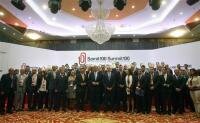
Tadic: We must rely on EU and our own resources
07. October 2011. | 07:03
Source: Emg.rs, Tanjug
Serbian President Boris Tadic stated Thursday that at this moment South-East European countries have no other choice but to continue with their EU integration and that in that process they have to at the same time rely on national and regional resources.
Serbian President Boris Tadic stated Thursday that at this moment South-East European countries have no other choice but to continue with their EU integration and that in that process they have to at the same time rely on national and regional resources.
At the summit of 100 leaders from South-East Europe, Tadic underlined that although the EU is currently faced with certain difficulties, there is no better economic model in the contemporary world.
“Until there is no better model, we must stick to the one we have, so at this moment there is no alternative to the EU,” Tadic said.
Voicing his regret over the fact that he cannot look into the future more optimistically taking into account the global economic turmoil, Tadic underlined that small countries must try to find their own solutions.
“I would be happy if I could utter words of greater optimism. Unfortunately, I cannot possibly do that because no one in the world, neither renowned economists nor political leaders, have the answer to where the world is heading,” Tadic explained.
According to him, the question is where small countries should head for, given that their small economies are the most fragile in the major financial crises.
“We must activate our internal - national and regional resources, and the countries in the region have to cooperate more closely. I have no intention of evoking Yugo-nostalgia, but I would like to draw attention to the fact that our economies are now not so far apart to prevent us from considering the joint entry in the foreign markets,” Tadic said in his address to the participants of the panel entitled “Agreement for a New Age”.
“Every government has its own responsibility for the area it is in charge of, and every manager for their own company, and now the question arises whether we in the region of South-East Europe can come up with a solution, since parts of that area lean on each other. We have our own resources which can be an answer to the challenges we are facing,” Tadic explained.
As he estimated, one of the main reasons why small economies have not managed to deal with the crisis in an adequate manner is a low level of economic coordination and slow decision-making, and that must change.
“If the world powers have to think of new ways to respond to these challenges, small countries have to do the same. We can no longer follow rigid economic systems and ideologies,” Tadic said, adding that bold decisions have to be made in the field of economy in the future, although at first they may not be met with great public approval.
The whole world is at the turning point, since one epoch is ending, and the other is being established, when the major economies, even that of the U.S., are faced with challenges and when the world powers are struggling to become the new economic leader.
“We are living in a gap, which creates a consternation and destructive action- in small countries in particular.
Today, small countries are waiting to see what will happen with big states, how deep we can go,” Tadic noted.
For that reason, the process of reconciliation in the region must continue and political stability must be preserved in every state of South-East Europe, which is vouched by the EU.
“Without reconciliation, we cannot create an environment which will foster economic growth since it cannot be achieved in the atmosphere of destruction,” Tadic said, stressing that all the issues, including Kosovo can be resolved through dialogue.
The process of reconciliation has already yielded certain results, but the political and economic cooperation have to be improved further, he said.
Using the example of the relations between Serbia and Croatia, he explained that regional economic cooperation has to go both ways, meaning that there should be less obstacles for investments.
Tadic explained that he talked with representatives of Croatian companies on several occasions about exporting Serbian food products to Croatia and that he received promises that have not been fulfilled.
“This is not a sustainable solution, since economy is a two-way street. If the Croatian economy is doing well, it must be the same for the Serbian economy, since no country can achieve a speedy growth with poor neighbours,” Tadic concluded.


 PRINT
PRINT
Comments (0)
Enter text: